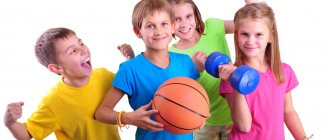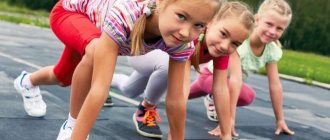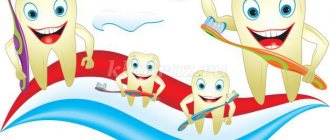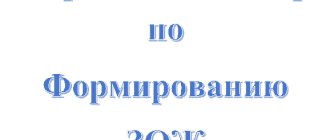MAGAZINE Preschooler.RF
Promoting a healthy lifestyle among students and their parents in preschool settingsAuthors: Irina Antonovna Maranina, head,
N.N. Padalka, senior teacher at the municipal budgetary preschool educational and kindergarten No. 18 “Solnyshko”
Primorsko-Akhtarsk, Krasnodar Territory, Russian Federation
annotation
The article is devoted to the problem of developing a healthy lifestyle in children of senior preschool age and their parents, introducing children and parents to regular physical education and rhythmic gymnastics.
Keywords
Health, healthy lifestyle, continuity, cooperation with parents, physical education, rhythmic gymnastics.
The concept of “health” has many definitions. But the most popular definition is the one given by the World Health Organization: “Health is a state of complete physical, mental and social well-being and not simply the absence of disease or infirmity .
The preschool institution and the family are called upon to lay the foundations of a healthy lifestyle at an early age, using various forms of interaction. It is in the family, in a children's educational institution at an early stage of development that a child should be helped to understand the enduring value of health, realize the purpose of his life, and encourage the child to independently form and maintain his health.
According to modern concepts, the concept of a healthy lifestyle for preschoolers includes the following components:
- optimal motor mode
- balanced diet; hardening
- personal hygiene
- positive emotions.
Following the necessary rules of a healthy lifestyle requires significant volitional efforts from a person, which is extremely difficult for a preschool child who has an insufficiently formed emotional-volitional sphere. And adults themselves rarely adhere to these rules in everyday life, and children see this well.
The relevance of this problem contributed to the creation in preschool educational institutions of a system of work to form the foundations of a healthy lifestyle in children and their parents.
“Formation of the foundations of a healthy lifestyle in preschool children” was developed , which became a tool for implementing the tasks set for the team.
The program includes 4 main blocks:
- introduction to physical culture and sports
- maintaining psychological health
- basics of safety and life
- food culture.
Purpose of the program:
- education of the foundations of a culture of health and safety, the formation of a preschooler’s ideas about himself and a healthy lifestyle, the rules of hygiene, and health protection.
Program objectives:
- to instill in children and parents the need for a healthy lifestyle as an indicator of universal human culture
- to introduce children and adults to the traditions of big sports (skiing, basketball, football, volleyball), to rhythmic and rhythmic gymnastics classes
- develop basic physical qualities (strength, speed, agility, endurance, etc.) and the ability to rationally use them in various conditions
- promote the assimilation of rules of compliance with hygiene standards and culture of life and nutrition
- develop ideas about the structure of one’s own body, the purpose of organs
- form ideas about what is useful and what is harmful to the body
- teach children traffic rules, behavior on the streets and roads
- to form life safety, develop knowledge and skills to act in dangerous life situations
- create an optimal daily routine that ensures the hygiene of the child’s nervous system and comfortable well-being.
To implement this program in kindergarten, conditions have been created for the full development of the child’s personality, ensuring his emotional well-being, respect for feelings and needs.
Working with employees is one of the most important areas for strengthening and preserving the somatic, psychological and physical health of children, built on the following principles:
- updating the attention of educators to the fact that in pedagogical valueology they have a main social role
- consultations with teachers on maintaining their own health, playing out possible problem situations with them: sick teacher - healthy student; healthy teacher – sick student; sick teacher - sick student
- consultations with educators on the basics of psychotherapy and neurophysiology
- training teachers in methods of personal self-diagnosis of health in the physical, social, mental aspects, as well as methods of teaching preschoolers methods of personal self-diagnosis.
Based on our goals, we have identified three main areas of work with parents:
- preschool educational institutions’ events with parents in order to increase their competence in various issues: open days, consultations, master classes, workshops, publishing newspapers, designing information corners
- preschool activities that bring together parents and children in order to get to know their child better: holidays, leisure, entertainment, tourist trips and hikes, etc.
- family events used in the work of preschool educational institutions in order to increase the initiative and interest of parents: exhibitions of joint works, competitions, creation of albums and projects.
As part of these activities, the following tasks were solved:
- overcome the barrier of parental mistrust in preschool educational institutions
- promote the experience of family education
- unite the parent team
- establish a trusting relationship between the family and the preschool educational institution
- involve families in a single educational space.
Over the years of work, a holistic system has been created that permeates all types of children's activities and is aimed at solving the following tasks:
- maintaining and strengthening children's health
- implementation of an integrated approach to the formation of a healthy lifestyle, through organizational activities, physical education, leisure, entertainment, holidays and club work.
- formation of a positive attitude towards healthy lifestyle in children and parents
teachers, through the creation of favorable conditions, a subject-spatial development environment, communication and active forms of work (holidays, camping trips, excursions, etc.)
- formation of valeological culture of children and parents
teachers on information support, organizing round tables, debates, classes and entertainment.
When planning work in this direction, we wanted, with the active support of parents, to form in children the basic skills of a healthy lifestyle, maintaining their own health, and introducing them to physical education and sports. In order to increase the level of knowledge and competence of employees in the issue of physical education and health improvement of preschoolers, we carried out a number of events:
- teachers' council with the participation of health care specialists;
- round table on the topic: “Problems of physical education of preschool children and the search for approaches to solving them” ;
- seminar-workshop “I take care of my health!” ;
- master class “How to teach a child healthy lifestyle skills” ;
- discussion with the participation of a teacher-psychologist, doctors, and physical education specialists from a children's sports school.
Well-established work to promote a healthy lifestyle in the institution allowed all employees of the preschool educational institution to take part in it. Health Days and industrial gymnastics were included in the working day. We regularly began to study in the health club “Grace” .
It has already become a tradition to hold a Spartakiad for adults between teams of staff and parents within the precincts of the kindergarten.
We built our joint work with the family according to the following principles:
- Unity of goals and objectives in raising a healthy child - that is, everything he learned in kindergarten would find its continuation and support in the family.
- Systematic and consistent work in accordance with a specific plan throughout the entire period of children’s stay in kindergarten.
- Individual approach to each child and each family, taking into account their interests and needs.
- Mutual trust and mutual assistance between teachers and parents. Strengthening the authority of the teacher in the family, and of parents in the preschool educational institution.
In accordance with these principles, we decided to familiarize parents not only with the content of physical education and health activities held in kindergarten, but also taught specific techniques and methods of health improvement, while creating individual routes for each family.
This route included a child health group, hardening and preventive measures, a plan for working with the family (consultations, practical classes).
With his help, we conducted systematic medical and pedagogical observation of each child. This allowed us not only to implement an individual approach, but also to involve parents in the joint improvement of the child’s body.
By the end of the first year of working on this system, we decided to find out the parents’ opinions and sum up the results. The survey results showed that we were able to interest and attract parents to their children’s health and sports activities. Most of them expressed the desire to “just play and work out with their child in a physical education or gym . “Healthy Family” on the basis of the kindergarten .
We have developed the Regulations on the work of the club, its Charter and action plan.
The participation of parents in popular sports activities that have become traditional, such as “Spartakiad for adults and children” , “Mom, Dad, I am a sports family” , “Healthy Family Day” , has made them much more interesting and varied. In the summer, together with the parents, trips to the sea, excursions, and field trips were organized.
Taking into account the numerous wishes of parents, teachers of the city children's sports school at the preschool educational institution organized rhythmic gymnastics classes for girls aged 5-7 years. Classes were held 3 times a week in the evening, mothers sat and waited for their children in the foyer of the kindergarten. We decided that we could take advantage of this situation and invited the mothers of the pupils to take part in joint activities with their children. As practice has shown, everyone liked this idea: teachers, parents and children.
Most people associate the word gymnastics with the concept of a beautiful slender body, strong muscles and graceful movements and correct posture. Thanks to this sport, children get rid of an awkward gait, shyness, and angularity. And musical accompaniment develops an ear for music, a sense of rhythm, and increases the emotional state of children. Rhythmic gymnastics is the most spectacular sport that helps improve motor functions and the all-round harmonious physical development of a child.
Thus, we were able to create strong motivation for physical exercise among parents and their children. And joint performances of parents and children in competitions and events at various levels contributed to the development of a sustainable interest in a healthy lifestyle and the introduction of all participants in the educational process to physical education.
Thanks to the work done, parents began not only to pay more attention to their children, but also changed their attitude towards their physical development and health.
To date, we can summarize our work:
- — 98% of parents are interested in what their children do in physical education classes;
- — 12% of children regularly exercise at home.
- — 25% of families answered positively to the question: “Are you an example for your child in promoting a healthy lifestyle ? Of these, 16 people began to regularly exercise in a health club and 9 people in a health club in the city.
- — 81% of surveyed families today regularly watch sports programs.
- — 77% of preschoolers independently (without an adult’s reminder) follow the rules of personal hygiene.
Over the two years of working under this system, 40 of our students began to additionally engage in sports sections, and 45 in the “Young Athlete” .
According to the results of monitoring, more than 65% of our kindergarten graduates continue their studies in sports clubs and sections of the city.
Thanks to systematized, systematic work and the use of various forms and types of joint work of employees and parents, we were able to reduce by the end of the school year the number of children with a low level of physical fitness from 25% to 16%, at the same time we achieved a reduction in the incidence rate by 3 %.
The use of the system in work contributed to the creation of a microclimate in our institution, which is based on responsibility in maintaining one’s own health, trusting relationships between adults and children, and the involvement of everyone in sports.
Understanding the importance of a healthy lifestyle for maintaining health, we strive to continue to create conditions for this. In the future, we intend to cooperate with other institutions of the city and region, involving as many participants as possible in the process of introducing physical education and sports.
Literature
- Alyamovskaya V.G. How to raise a healthy child. - M.: TC Sfera, 1993.
- Bezrukikh M. M. Health that shapes physical development. Developmental motor programs for children 5-6 years old. - M.: TC Sfera, 2001.
- Voloshina L.N. Education of motor culture of preschool children. - M.: TC Sfera, 2005.
- Vavilova E.N. Strengthen children's health: A manual for kindergarten teachers. — M.: Enlightenment. 1996. – 128 p.
- Golitsina N.S., Shumova I.M. Instilling the basics of a healthy lifestyle in children. – M.: Publishing house “Scriptorium 2003” , 2008. – 120 p.
- Gavryuchina L.V. Health-saving technologies in preschool educational institutions: a methodological manual. M.: TC Sfera, 2007. – 160 p.
- Zmanovsky Yu.F. “Motor activity and hardening are the leading factors in strengthening a child’s health . - M.: TC Sfera, 1998.
- Zmanovsky Yu.F. Non-traditional methods of improving children's health. — M.: Sphere shopping center. 1999.
- Kartushina M.Yu. Green light of health: Health improvement program for preschool children. - M.: TC Sfera, 2007. - 208s;
- Kirilova Yu.A., Lebedeva M.E. Integrated physical education and speech classes for preschoolers with special needs aged 4-7 years. - St. Petersburg: CHILDHOOD - PRESS, 2005.
- Kudryavtsev B.T., Egorov B.B. Developmental pedagogy of health improvement. - M.: ARKTI, 1999. - 120 p.
- Kudryavtsev B.T., Egorov B.B. Weakened child: development and recovery - M.: ARKTI, 1999. - 120 p.
- Modern technologies for preserving and strengthening children's health: Textbook / ed. N.V. Socrates. – M.: Sfera shopping center, 2005. - 224s.
- Sizova N.O. Valeology. Notes of complex classes in kindergarten. - St. Petersburg: Paritet, 2008. - 96 p.
- Umanskaya A.A. Using massage of active vital points to increase the body's protective properties. - M.: TC Sfera, 1987.
- Yurko G.P. Age-related characteristics of responses in preschool children to physical activity. – M.: Education, 1998.
| Next > |
Healthy lifestyle in a preschool setting
It is known that health is one of the most important components of human well-being and happiness, one of the inalienable human rights, one of the conditions for successful social and economic development of any country. Life in the 21st century presents us with many new problems, among which the most pressing today is the problem of maintaining health and developing the habit of a healthy lifestyle. Our future is our children. The future of Russia depends on the health of the younger generation. Modern scientists state that the problem of maintaining and strengthening health does not lose its relevance, but on the contrary, it is becoming more significant, since a generation of our children is born with poor health, and this trend is growing. Therefore, it is very important to pay special attention to promoting health and developing physical qualities, forming the foundations of a healthy lifestyle, according to the Federal State Educational Standard for Education.
Reform of the health care system, curtailment of preventive work, low literacy of parents do not contribute to maintaining the level of health of children. Understanding the importance of this problem, comparing the personnel and information potential with the introduction of the Federal State Educational Standard for Education in the educational process, the kindergarten staff embarked on the path of searching for means to preserve the health of children and improve their level of health. But not only children, but also parents. It is known that preschool age is decisive in the formation of the foundation of physical and mental health. It is during this period that intensive development of organs takes place, the formation of functional systems of the body, the main personality traits are laid, character and attitude towards oneself and others are formed. That is why it is so important to form the habit of a healthy lifestyle in preschool age. Forming the need for a healthy lifestyle should be done easily and unobtrusively, but always with pleasure and sincere interest on the part of both adults and children.
The role of teachers has changed. We must not only teach children the basic types of motor skills, provide high-quality knowledge to children, but also form a conscious attitude towards a healthy lifestyle, teach them from an early age to live in harmony with themselves and the world around them. Properly organized educational work with children often ensures to a greater extent the formation of health and a healthy lifestyle.
So, the health of children, in general, is becoming a national problem, and the formation of a healthy lifestyle of the younger generation is one of the main components of a healthy lifestyle culture. Understanding the significance of this problem, we began work in this direction, realizing that a child’s attitude towards his health directly depends on the concept of “healthy lifestyle” formed in his mind. To do this, it was determined that each age group has its own tasks and forms of organizing health-saving work.
In younger groups:
- these are the rules for performing physical exercises (listen carefully to the signal, wait for each other, do not push, coordinate your actions with the actions of your partner, control and coordinate movements),
- performing hygiene procedures;
- introduction to healthy foods.
Advertising message
In senior and preparatory groups
- this is the formation of a stable habit of physical activity, familiarization with disease prevention, self-massage, hardening, proper breathing, alternating active movement and rest;
- development of perseverance and determination in caring for one’s body through physical education and health activities;
- acquaintance with food culture, rules of behavior at the table;
- familiarization with the rules of first aid in case of injury;
- introduction to active recreation;
- developing the habit of physical education and doing morning exercises;
- instill compliance with hygiene rules.
These tasks allowed us to take a differentiated approach to organizing work in this direction.
For the formation of a healthy lifestyle and full physical development in kindergarten, all the necessary conditions were created:
- ·Gym, equipped with “Health Tracks”, “Wall Bar”, “Sports Complex”;
- ·modern equipment for sports and outdoor games;
- ·non-standard physical education equipment for outdoor switchgear, landmarks;
- ·a magnificent outdoor sports ground with a green lawn;
- · sports corners are equipped for independent physical activity in each age group, in accordance with the Federal State Educational Standard for preschool educational institutions;
- · there are button tracks, “Health” tracks for hardening;
- · in the groups there is visual material on the topics “First aid for injury”, “Healthy lifestyle”, “Healthy food products”, “Bad habits - what are they?”
When organizing work with children, we tried to make maximum use of various physical qualities; in the learning process, using various forms of playful and competitive nature, children like it. But one of the main directions in the work of our preschool institution is working with parents of pupils. After all, the problem of education and the formation of the foundations of a healthy lifestyle can be successfully solved through joint actions, mutual trust and understanding between parents and teachers. Not a single, even the best physical education and health program can give a full result if it is not decided together with the family, if a child-adult community of children - parents - teachers is not created in the kindergarten, which is characterized by assistance to each other, consideration of opportunities and interests of everyone, their rights and responsibilities. From the first days of meeting parents, we show and tell everything that awaits their children in kindergarten, paying attention to issues related to the children’s health. Our task is to convey to parents how important it is to realize the fact that only they are adults and people close to their children who will be able to lay the foundation for a healthy attitude towards their health, that they, parents, are role models for their children. In this regard, we involved the families of the pupils in this work. Events such as “Health Day” and “Olympic Games” were held together with parents. But not only parents took part in the sports events of our kindergarten; the younger generation of students of the VGI (branch) of VolSU in the city of Volzhsky was also involved in this work. The children, together with the kindergarten students, held “Summer Games”, “Autumn Marathon” and a themed holiday “The ABCs of Healthy Eating”. They happily took part in various events held in kindergarten related to healthy lifestyle.
It should be noted: forms of organizing work with parents to promote healthy lifestyle in kindergarten .
Visual: information pages, consultations, recommendations, posters, publication of booklets for parents on promoting a healthy lifestyle.
Practical: joint holidays and entertainment. This form of working with parents deserves special attention.
- “Health Day” for children in the preparatory group. During the festive event, the roles were played by the parents of the students. The holiday took place all day long and brought a lot of joy and pleasure. During the event, those present played games, held quizzes, and competitions on the topic of healthy lifestyle.
- “The sports festival “Children's Day”, together with students of VGI (branch) of VolSU, was remembered for the variety of relay races, competitions, and a variety of outdoor games.
- “Regional Konstantinovsky Festival” (participation of children and parents in competitions and relay races);
- “Olympic Hopes” (sports festival for children and parents);
- "Cross of the Nation";
- Sports festival “Kindergarten “Gulliver - Territory of Health” (within the framework of network interaction between kindergartens No. 105,111,113).
Thanks to systematic work, cooperation with parents and social partners, interest in the problem of promoting a healthy lifestyle among preschool children and their parents has increased. Adults have become more interested in their children's progress in health and fitness. The experience acquired by children and parents in this area allowed them to develop a reasonable attitude towards their body, compliance with sanitary and hygienic skills, and a healthy lifestyle. Parents became active participants in the kindergarten's sporting events.
Literature:
1. Galanov A.S. Physical education is joy - sports games with non-standard equipment. M-Sphere, 2004-26p.
2. Efimenko N.N. Theater of physical development and recovery. M-Sphere, 2007-123p.
3. Kovalko V.I. Health-saving technologies. M-"Enlightenment", 2004-122p.
4. Morgunova O.N. Physical education and health work in preschool educational institutions. M-"Sphere", 2007-143 p.
Sinitsyna Tatyana Vladimirovna, physical education instructor Izvoryanu senior teacher Tomchuk teacher of preschool educational institution No. 113 “Gulliver” . Volzhsky, Volgograd region




